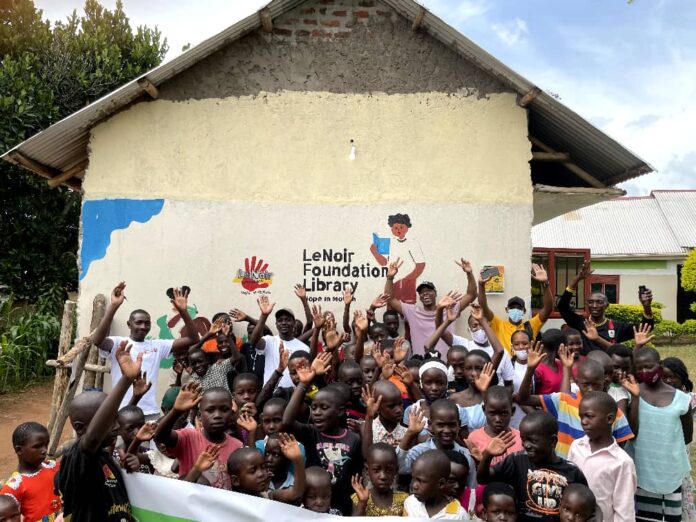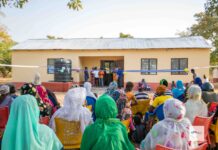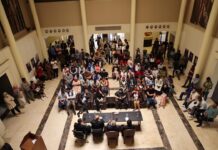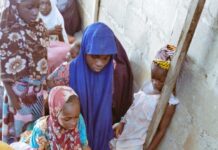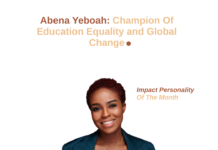By 2030, 230 million jobs across Africa will require some level of digital skills. This corresponds to 650 million potential training opportunities and a market worth an estimated $130 billion.
The recent coronavirus pandemic accelerated digital adoption across the globe including Africa and has forced many businesses to become digital to survive. However, the African continent still records a severe lack of digital skills, which is hindering its development and economic potential. But to solve the problem of digital skills, access to basic digital tools such as computers and the internet is very crucial.
Here is Lenoir Foundation, a nonprofit organization that is working to address the digital divide in Africa by partnering with communities to build E-labs.
E-labs are well-furnished internet and digital technology centres that seek to tackle the issue of “access” in most remote and rural communities where computers are hard to own and the internet is expensive. For example, before any hard skills such as coding can be introduced, there should be a computer and the Internet; making the E-labs fundamental in our quest to bridge the wide digital divide.
According to the Internal Finance Cooperation, about 80% of Europe’s population is connected to the internet, but in many parts of Africa, access remains the preserve of a minority. For instance, In Uganda, a country of over 45 million population, only 26% have online access.
Bridging the wide digital divide is a key catalyst to Africa’s socio-economic growth. For Africa to reach international parity, we would need to quickly act and scale innovations like that of Lenoir Foundation who seeks to marshall their operations across East Africa by impacting 100,000 young lives across 80 schools.
Work
Their journey started in 2018 when they opened their first school in New Delhi—teaming up with the Vasudev Foundation, an NGO based in India. Through this successful pilot project, Lenoir built a school for underprivileged children aged 4–8 years old.
With the help of the local community and volunteer teachers, they enrolled over 30 new students in their opening week.
Library
The Lenoir Foundation also builds and enhances libraries so students, especially girls, can thrive in happy, interactive spaces where dreams are born and nurtured.
In October 2021, the Lenoir Foundation built and opened its first library in Uganda. In partnership with St. Peters Musheija primary school in Kyenda town, a few kilometers from Kampala, Previously, the school lacked a functioning library, and with the construction of a new three-classroom block and library, it now serves over a hundred students. The new classrooms provided kindergarten students, who were previously learning in exposed and unfavorable conditions, the opportunity to learn in a new structure with formal classroom settings.
With the help and funding from the national lottery community fund (NLCF) in the UK, the Lenoir Foundation is constructing a second library in Congo Brazaville, due to open in autumn 2022.
Scholarship Programme
Early this year, the Lenoir Foundation partnered with Imani Academy in Kampala, Uganda, to offer a full-year (2022) scholarship fully funded to several children from struggling families.
Jay commented, “When we visited the school for our last mission trip, we learned that it offers high-quality education at an affordable price.” However, some parents are still unable to afford it due to economic hardships. That’s why we chose students from low-income families whose parents are struggling to make ends meet. We want to help them acquire an education they normally could not afford.
Jay believes partnerships like these will increase the efficiency of schools by providing educational opportunities for underprivileged children in different communities.
The Future
The Foundation has the prospect of incorporating technological advancements like iPads and e-readers, increasing the focus on gender parity and positive outcomes for girls. In addition, they aim to partner with companies who will purchase or donate IT equipment as part of their corporate social responsibility initiatives, build more robust, fully resourced libraries, and continue to share their profoundly impactful story. With the help of their global family, donors will be able to make a difference in thousands of children’s lives.
About the Founder
A self-made British national, James Jay Mawaka is an author, philanthropist, and keynote speaker. He is the founder of the Lenoir Foundation, an award-winning UK registered charity that has grown into an internationally recognized organization. born in Bulawayo, Zimbabwe, but was able to migrate to the United Kingdom at a young age. Jay graduated from London South Bank University and continued his education by studying Social Entrepreneurship at the University of Oxford.



